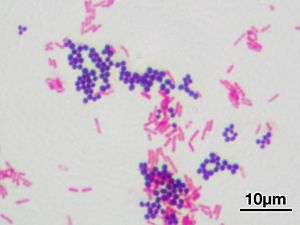Infectious disease (medical specialty)
Infectious diseases, also known as infectiology, is a medical specialty dealing with the diagnosis and treatment of complex infections. An infectious disease specialist's practice consists of managing nosocomial (healthcare-acquired) infections or community-acquired infections and is historically associated with travel medicine and tropical medicine.
 Gram stain of bacteria: a test frequently performed in infectiology to distinguish between different types of bacteria. | |
| Synonym | Infectious diseases, infectious medicine, infectious disease medicine |
|---|---|
| Significant diseases | Infections, e.g. osteomyelitis, pneumonia, tuberculosis, covid-19, HIV/AIDS, influenza, also public health issues e.g. epidemics, antimicrobial resistance, bioterrorism |
| Significant tests | Gram staining, microbiological cultures (including blood cultures), serological tests, genotyping, polymerase chain reaction (PCR), medical imaging |
| Specialist | Infectious disease specialist, Infectiologist, Infectionist |
| Glossary | Glossary of medicine |
Scope
Infectious diseases specialists typically serve as consultants to other physicians in cases of complex infections, and often manage patients with HIV/AIDS and other forms of Immunodeficiency.[1] Although many common infections are treated by physicians without formal expertise in infectious diseases, specialists may be consulted for cases where an infection is difficult to diagnose or manage. They may also be asked to help determine the cause of a fever of unknown origin.[1][2]
Specialists in infectious diseases can practice both in hospitals (inpatient) and clinics (outpatient). In hospitals, specialists in infectious diseases help ensure the timely diagnosis and treatment of acute infections by recommending the appropriate diagnostic tests to identify the source of the infection and by recommending appropriate management such as prescribing antibiotics to treat bacterial infections. For certain types of infections, involvement of specialists in infectious diseases may improve patient outcomes.[3] In clinics, specialists in infectious diseases can provide long-term care to patients with chronic infections such as HIV/AIDS.
History
Infectious diseases is historically associated with travel medicine and tropical medicine, as many diseases acquired in tropical and subtropical areas are infectious in nature.[4]
Investigations
Infectious diseases specialists employ a variety of diagnostic tests to help identify the pathogen that is causing an infection. Common tests include Gram staining, blood cultures, serological tests, genotyping, and polymerase chain reaction.
Treatments
Infectious diseases specialists employ a variety of antimicrobial agents to help treat infections. The type of antimicrobial depends on the organism that is causing the infection. Antibiotics are used to treat bacterial infections; antiviral agents treat viral infections; and antifungal agents treat fungal infections.
Training
| Occupation | |
|---|---|
| Names | Doctor, Medical Specialist, Infectious diseases Consultant |
Occupation type | Specialty |
Activity sectors | Medicine |
| Description | |
Education required | Doctor of Medicine (M.D.) or Doctor of Osteopathic Medicine (D.O.) or Bachelor of Medicine, Bachelor of Surgery |
Fields of employment | Hospitals, Clinics |
United States
In the United States, infectious diseases is a subspecialty of internal medicine and pediatrics[5] i.e., an internist does at least an additional two years of a fellowship and a pediatrician does at least three years to qualify as an infectious diseases specialist and take the infectious diseases board certification exam of the American Board of Internal Medicine or the American Board of Pediatrics. The exam has been given as a subspecialty of internal medicine since 1972 and as a subspecialty of pediatrics since 1994.[6][7]
References
- "IDSA : What is an ID Specialist". www.idsociety.org. Retrieved 2015-10-27.
- "ABMS Guide to Medical Specialties" (PDF).
- "The Value of an Infectious Diseases Specialist | Safe HealthcareSafe Healthcare | Blogs | CDC". blogs.cdc.gov. Archived from the original on 2015-11-17. Retrieved 2015-11-14.
- Joint Royal Colleges Postgraduate Training Board. "Infectious Diseases". Archived from the original on 2013-12-12. Retrieved 2013-12-12.
- "Infectious Disease, Internal Medicine". Association of American Medical Colleges. Archived from the original on 2015-02-06.
- "Exam Administration History". abim.org. American Board of Internal Medicine. Retrieved 25 April 2019.
- Douvoyiannis, Miltiadis; Litman, Nathan; Belamarich, Peter; Goldman, David L. (2011). "A survey of current and past Pediatric Infectious Diseases fellows regarding training". BMC Medical Education. 11: 72. doi:10.1186/1472-6920-11-72. PMC 3188472. PMID 21943353.
External links
![]()